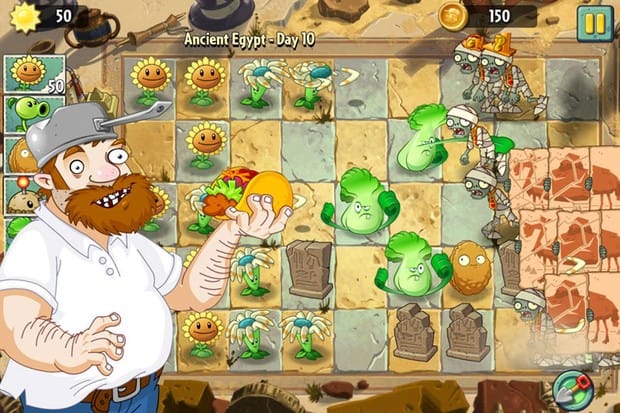Plants vs. Zombies 2 is a pun of a videogame

The formula seems to be, well, a formula
At a recent seminar, one unrelated to plants or zombies, an audience member in a discussion still winced at the idea that mobile games had entered the broader lexicon. It caught me off guard. I had thought the general flames of the one-sided war between “hardcore” and “casual” games had been extinguished; tablet games proved, irrefutably I had thought, that short bursts could be simultaneously uncanny, friendly and niche.
There is room for radically successful games large and pocket-sized. Mobile devices, in their vast numbers, have merely proven efficient at making casual games successful. The formula seems to be, well, a formula: take a working structure, execute it solidly, and, with a bit of luck, sell a few million copies. Among these games, Plants vs. Zombies proved to be both that rare breed that is both accessible enough for general audiences and rich enough mechanically for the more seasoned portions of the gaming audience. It sold a few hundred thousand copies in its first week on shelves, and has since been ported to pretty much everything that has a screen.

Almost four years later, PopCap has revisited the garden to see what has grown in the interim. The answer, at least initially, is a bumper crop of wackiness. A man who we are encouraged to call “Crazy Dave” has gone back in time to re-eat a taco he had enjoyed the first time he ate it; he and his now-talking van discover that zombies in ancient Egypt, the high seas and the old west; you plant things accordingly.
As one might expect, puns sprout like weeds; the plant selection has also grown entirely on wordplay possibilities.
Your peapod shooters and sunflowers don’t don dusters and eyepatches in the interchanging eras, but the three worlds do offer their own distinct undead. As one might expect, puns sprout like weeds; the plant selection has also grown entirely on wordplay possibilities. “Bonk choy,” “iceberg lettuce” and fire-breathing “snapdragons” serve functions you could probably land within three guesses. There’s also an additional set of touch abilities you can purchase that let you just poke the zombies dead, an ability so inorganic I often found myself forgetting it existed.
From there, the game proceeds largely as the original did, with a steady drip-feed of new abilities and challenges that pit an entire narrative arc, complete with climax and falling action, in the span of ten minutes. Mobile games are capable of deep, extended experiences, as in Superbrothers: Swords & Sworcery or Horn, but Plants vs. Zombies 2 is pitched to only tug at your attention in daytime downtime and nibbling commutes.

If casual and conventional games do have one massive alternative goal, it may be casual games’ glass ceiling of ambition. These are, after all, smaller experiences, but with all the money in the world to make Popcap has to sow themselves out of a corner. A console game’s sequel asks their hero to tackle a newer, larger threat with an arsenal of new guns. Rovio sent their birds into space, changing their formula fairly drastically. Popcap sends your seeds into time, mostly creating convenient expanding, alternating chapters for the present and beyond.
Birds hate pigs. Monkeys hate the temple runner. Plants hate zombies.
Birds hate pigs. Monkeys hate the temple runner. Plants hate zombies. And certain players hate games like Plants vs. Zombies 2. I can’t count myself among them. They’re entirely different in scope and goal; they deserve a lesser commitment but only because that is the exact thing they’re seeking from you. They are, like puns, slight, but no less capable of the sublime.



